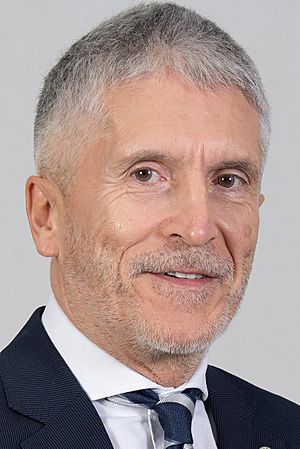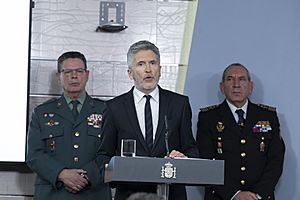Fernando Grande-Marlaska facts for kids
Quick facts for kids
The Most Excellent
Fernando Grande-Marlaska
MP
|
|
|---|---|

Official portrait, 2023
|
|
| Minister of the Interior | |
| Assumed office 7 June 2018 |
|
| Monarch | Felipe VI |
| Prime Minister | Pedro Sánchez |
| Preceded by | Juan Ignacio Zoido |
| Member of the General Council of the Judiciary | |
| In office 4 December 2013 – 7 June 2018 |
|
| President | Carlos Lesmes Serrano |
| Chair of the Criminal Chamber of the Audiencia Nacional | |
| In office 16 April 2013 – 6 June 2018 |
|
| Preceded by | Javier Gómez Bermúdez |
| Member of the Congress of Deputies | |
| Assumed office 17 August 2023 |
|
| Constituency | Cádiz |
| In office 21 May 2019 – 21 February 2020 |
|
| Constituency | Cádiz |
| Personal details | |
| Born |
Fernando Grande-Marlaska Gómez
26 July 1962 Bilbao, Spain |
| Spouse |
Gorka Gómez (m. 2005)
|
| Alma mater | University of Deusto |
Fernando Grande-Marlaska Gómez (Spanish pronunciation: [feɾˈnando ˈɣɾande maɾˈlaska]; born 26 July 1962) is a Spanish judge and politician who has served as minister of the Interior since June 2018. An independent politician close to the Spanish Socialist Workers' Party, he has been Member of the Congress of Deputies since 2023, representing Cádiz. He had already represented that province from 2019 to 2020.
Grande-Marlaska is a well-known judge since the early 2000s for his time at the Audiencia Nacional, where he tried several members of the Basque terrorist group ETA and he led the trial that followed the Yak-42 accident, among other relevant cases. He also served as Member of the General Council of the Judiciary —the governing body of the Spanish judiciary— from 2013 to 2018.
Contents
Biography
Early life and career
Born in Bilbao, he is the son of Avelino Grande, an officer of the Bilbao Municipal Police. He entered the judicial career in 1987 and served in the Court of First Instance and Inquiry in Santoña, Cantabria, from where he was the investigating magistrate in the case against Rafael Escobedo for the Assassination of the Marquesses of Urquijo. In 1990, he moved to Bilbao's Court of Inquiry No. 2, where he remained for nine years. At that time, he promoted the presiding judge of the Sixth Section of the Criminal Division of the Provincial Court of Biscay.
In 2003, he moved to Madrid as investigating judge of the district of the 36th Court of Inquiry.
In 2004, he was appointed to the Audiencia Nacional as a substitute judge for Judge Baltasar Garzón in the Central Court of Inquiry No. 5, where he made his name at the national level, and was already known as an instructor in Bilbao.
Magistrate of the Audiencia Nacional
Until 30 June 2006, he was a member of the Central Examining Court number 5 of the Audiencia Nacional, temporarily replacing its head, Judge Baltasar Garzón. When Garzón returned to his post on 1 July 2006, Grande-Marlaska was assigned to the Criminal Division of the Audiencia Nacional. He ran as an independent candidate for the General Council of the Judiciary (2006), but was not elected.
In 2007, he took over from Teresa Palacios the Central Examining Court No. 3 of the Audiencia Nacional.
At that time, he took up the most important case: the Yak-42 accident in Turkey, which killed 62 soldiers on their return from Afghanistan on 26 May 2003. However, four months after arriving at the courthouse, on 1 June 2007, he shelved the case and attributed the responsibility to the Ukrainian crew, clearing the Ministry of Defense of the accident for hiring an unsafe plane. He also found unnecessary the identification of 30 corpses.
However, on 22 January 2008, the Fourth Section of the Criminal Division unanimously revoked the decision to shelve the case, alleging that the judge had not exercised any diligence and had failed to defend the victims constitutional right to due process. Once the case was reopened, he called as witnesses the military leadership of the time, as well as former ministers Federico Trillo and José Bono, but exonerated high-ranking officials of the Ministry of Defense of guilt despite their having been reported on the poor state of the aircraft. Finally, on 20 May 2008, he charged five high-ranking military commanders, including the Chief of the Defence Staff, Antonio Moreno, the highest military officer at the time of the accident, with 62 counts of serious negligence.
On 30 August 2007, he ordered the opening of an oral trial for insulting the Crown to several graphic artists. In June 2007, it was decided to close the case against four directors of Air Madrid for alleged fraud committed during the crisis that affected the airline in December 2006 and, in September 2007, rejected the appeals filed by the General Association of Consumers and Users and the Organization of Consumers and Users (OCU) against the car's filing.
On 23 February 2012, he was appointed President of the Criminal Chamber of the Audiencia Nacional, replacing Javier Gómez Bermúdez.
On 29 November 2013, he was appointed as a member of the General Council of the Judiciary, at the proposal of the People's Party, by the Senate.
Minister of the Interior
In 2018, the President of the Government of Spain, Pedro Sánchez, appointed Grande-Marlaska as Minister of the Interior. Briefly after assuming the office, Grande-Marlaska announced his intention of removing the barbed wire on fences between Morocco and the Spanish cities of Ceuta and Melilla. In January 2019, the Council of Ministers approved the "Plan for the Reinforcement and Modernization of the Terrestrial Border Protection System in Ceuta and Melilla" with a value of 32 million euros, which also included extending the height of the fences and introducing new technological elements. Specifically, the sole withdrawal of the barbed wire is valued at 18 million. The removal of the barbed wire and the border security measures upgrade started in December 2019. On February 17, 2020, the minister announced before the Congress of Deputies' Home Affairs Committee that the fences would be raised by 30%, around 10 meters.
On March 14, 2020, the Council of Ministers approved the "State of Alarm" due to the coronavirus pandemic in Spain. That measure gave the central government extraordinary powers to directly control the regional and local administrations and establish some constitutional rights restrictions. Prime Minister Pedro Sánchez appointed Grande-Marlaska as one of the four "delegated competent authorities" and gave him the command over all state, regional and local law enforcement agencies as well as the power to close all needed roads and borders. In the use of these extraordinary powers, on March 15, 2020 the minister issued an order to all police forces to apply, in case of non-compliance by citizens with the measures established by the government, article 36.6 of the 2015 Law on Citizen Security which establishes fines of between €100 and €600,000 and, in case of severe disobedience, articles 550 to 556 of the Criminal Code, which establishes jail sentences up to 4 years.
During the immigration crisis in May 2019, thousands of migrants crossed the Spanish-Moroccan border in Ceuta; Grande-Marlaska in turn announced a firm stance to "defend Spanish soil" by means of a reinforcement of 200 new Civil Guard officers sent over to the border, as well as the devolution of 2,700 people back to Morocco. On the issue of unaccompanied minors who had made their way into Ceuta illegally, the minister supported in August 2019 the attempt to send them back "for their own benefit", considering that they were not vulnerable and the expulsion did not pose a threat to them.
Personal life
Grande-Marlaska is openly gay and has been a long time activist against gay bullying. He is married since 2005 to his longtime partner, Gorka Gómez.
See also
 In Spanish: Fernando Grande-Marlaska para niños
In Spanish: Fernando Grande-Marlaska para niños


